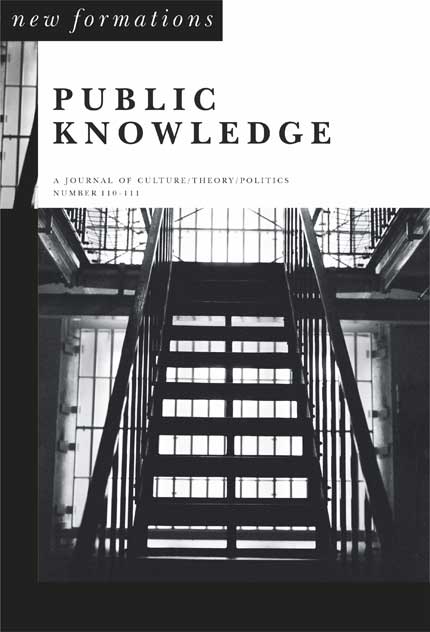
New Formations Volume 2023 Issue 110 & 111
Print ISSN 0950-2378 - Online ISSN 1741-0789
<< Previous issue | All issues | Next Issue >>
Print edition of this issue available for £25 Add to cart
Digital edition of this issue available for £15 Add to cart
Public Knowledge
This issue of New Formations brings together articles which question how 'knowledge' is made, and made public, and considers the complex relationships between the academy and the wider public sphere. It provides analyses, proposals and critiques which we hope will impact on the wider field of knowledge-production. David Ridley interrogates the contemporary re-application of human capital theory to higher education, while Janneke Adema and Samuel A Moore evaluate recent debates on the place of scholarly labour in the field of academic publishing and on the ability of academic institutions to recognise this as scholarly work. Also concerned with the politics of academic work, Howard Stevenson's article considers the role of unions and labour organisation in the UK higher education sector. Julian Dobson, Julia Udall, Chris Baker and Amanda Crawley Jackson consider the implications for the development of the civic university of the political agenda and knowledge transfer which reinvents the UK as a 'science superpower'. Jonathan Paylor's contribution envisions an alternative, empowering mode of university governance which is conceived in terms of collective creativity.
Mark Hayward's article explores the history of information systems in higher education and their adverse impact on formalised collective decision-making on campus. Eszter Pál interprets recent changes in the structure of the scientific field, discussing its recolonisation observed in twenty-first-century autocracies. Gary Hall considers the implications of the overwhelming bias towards privately-educated, elite-university graduates within the English arts funding system while Maureen Ryan and Leigh Goldstein identify a form of cultural production – '(academic) feminist lifestyle media' – for an academically literate non-academic readership, which offers feelings of intimacy and belonging to its public, often by effacing privilege. Karen Charman highlights the work of the Public Pedagogies Institute as an example of an educational institution which challenges the norms of elite intellectual culture, while Hannah Yelin and Laura Clancy look at what happens when the 'public' becomes a less positive space of engagement, arguing that there cannot be meaningful, radical potential in public knowledge-sharing if we cannot protect those most at risk of harm in the process.
Contents
Editorial, pages 4‑7
Jeremy Gilbert Free to download
‘Just One Day of Unstructured Autonomous Time’: Supporting Editorial Labour for Ethical Publishing within the University, pages 8‑27
Janneke Adema, Samuel A. Moore Free to download
Power, Knowledge, the Academy and Beyond, pages 28‑41
Karen Charman
Commoning Civics: Exchanges of Knowledge Beyond the ‘Civic University’, pages 42‑59
Julian Dobson, Julia Udall, Chris Baker, Amanda Crawley Jackson
Culture and the University as White, Male, Liberal Humanist Public Space, pages 60‑77
Gary Hall
System Lag: Re-Building the Collective Governance of Information Technology, pages 78‑94
Mark Hayward
Experts and Amateurs in Times of Transition: From Decolonising to the Re-Colonisation of Science, pages 95‑112
Eszter Pál
From Sadness to Joy: The Potentials of Transforming the Impact Agenda, pages 113‑130
Jonathan Paylor
Educating for a Just Transition, or the Poverty of Human Capital Theory, pages 131‑146
David Ridley
Inside/Out the University: (Academic) Feminist Lifestyle Media and Its Minor Forms, pages 147‑163
Maureen Ryan, Leigh Goldstein
Reclaiming the Public University: What Role for Higher Education Workers and Trade Unions?, pages 164‑186
Howard Stevenson Free to download
‘I Have a Folder in My Email Called Hate Mail’: Academic Public Engagement, Digital Hate and the Unequally Distributed Risks of Visibility, pages 187‑206
Hannah Yelin, Laura Clancy
Roundtable
Schools, Austerity and Neoliberalism: A Discussion with Sharon Gewirtz and Diane Reay, pages 207‑233
Free to download
Reviews
Booknote: Writing Selves, pages 234‑235
Max Shirley Free to download
